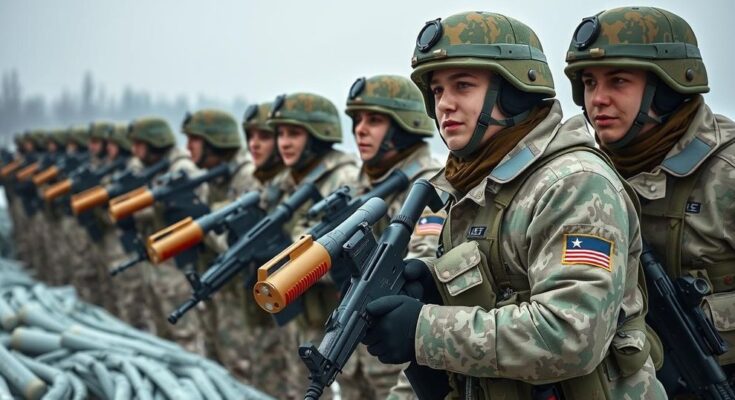North Korean troops have joined Russian forces in Ukraine, significantly impacting the conflict as they gain battlefield experience. Initially inexperienced, they have shown adaptability and discipline, presenting new challenges for Ukrainian military strategy. Reports indicate that the integration of these troops could elevate North Korea’s military capabilities, creating broader security implications for the region.
In recent months, North Korean troops have been deployed to assist Russian forces in Ukraine, marking a significant escalation in the ongoing conflict. Ukraine’s military has faced formidable challenges from these newly encountered adversaries, who, despite initial inexperience, have rapidly adapted to battlefield conditions. Soldiers from North Korea, reportedly numbering between 10,000 and 12,000, have been integrated into the Russian military structure, raising the stakes in this protracted war. This situation signals a potential shift in regional dynamics, emphasizing that Pyongyang’s engagement could lead to enhanced military capabilities for both North Korea and Russia.
Although North Korean soldiers have displayed a certain level of discipline—sometimes perceived as superior to their Russian counterparts—Ukrainian forces have noted their fundamental tactical flaws, particularly their outdated formations and strategies. Despite these issues, the North Korean forces are swiftly learning from the battlefield, which poses a significant threat to Ukrainian defenses. Notably, the extensive roster of North Korean troops, combined with their training routines, enhances their potential military effectiveness over time, indicating a pressing global security concern.
Moreover, the covert nature of the North Korean deployment complicates matters; Russian authorities have not formally acknowledged their presence, allowing for deniability in international fora. Yet, the confirmed exchanges in communication and the identified use of their own weaponry suggest a deeper intertwining of military strategies between Moscow and Pyongyang. Ukraine’s intelligence indicates that the North Korean presence significantly bolsters Russia’s manpower, critical for maintaining aggressive tactics along the frontlines, particularly in strategic locations such as Kursk.
The North Korean troops’ reluctance to surrender underscores a deeply entrenched military culture that values loyalty over individual survival, indicating that even captured soldiers may not provide valuable intelligence. This dedication poses unique challenges for Ukraine in terms of capturing enemy personnel for strategic advantage. Furthermore, as North Korea absorbs lessons from this engagement, its military capabilities may see substantive improvements, reinforcing the belief that the global community must remain vigilant in monitoring the implications of this evolving relationship.
In summary, the integration of North Korean troops into the conflict in Ukraine reflects a critical juncture that could reshape military strategies and alliances in the region, potentially leading to significant consequences for global security.
The incursion of North Korean troops into the Russian-Ukrainian conflict represents a complex development that highlights the evolving nature of military alliances. Following an agreement between Pyongyang and Moscow to provide mutual military assistance, the presence of 10,000 to 12,000 North Korean soldiers has introduced an unfamiliar threat to Ukrainian forces. Historically, North Korea has been largely confined to its borders since the Korean War, with limited engagement in modern combat scenarios. The latest conflict is a unique opportunity for North Korean forces to gain practical military experience amid advanced warfare technologies employed by both sides.
The ongoing presence of North Korean troops in Ukraine not only bolsters Russian military capabilities but also signifies the potential for an escalation of conflict dynamics in the region. As North Korean soldiers adapt and acquire combat experience, they may become a formidable force, posing broader implications for international security. Both Ukraine and the global community must assess the ramifications of this alliance, as the lessons learned by North Korea could have lasting effects on regional and global military balances.
Original Source: www.newspressnow.com




